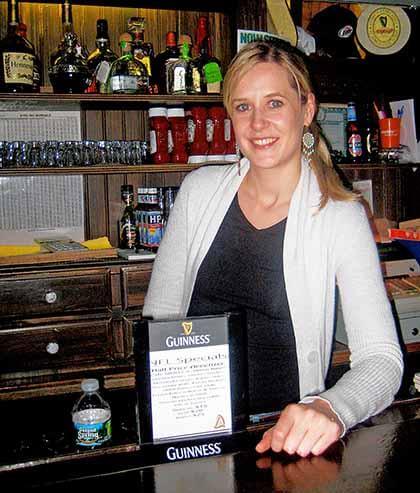By Rebecca Henely
Members of the Irish community in western Queens were saddened and expecting another wave of emigration from Ireland to the United States after the European Union agreed to provide the country with a more than $100 billion bailout this week.
“It’s a bit disappointing that Ireland had to do that, that they had to go to that extreme,” said Jackie Lenihn, an Irish bartender at Sean Ogs at 60-02 Woodside Ave. in Woodside.
The Republic of Ireland had been trying to extricate itself from an ongoing debt crisis ever since it took on its banks’ losses after the real estate bubble burst in 2008, The New York Times reported. For months the Irish government had tried to get out of debt with its plan to implement a four-year budget plan with cutbacks, but it recently gave in and applied to the EU for a bailout.
Ciaran Staunton, a Sunnyside resident and co-founder of The Irish Lobby for Immigration Reform, said this change in Ireland’s fortunes was upsetting, considering how flush with money the island was in the 1990s and part of this decade.
“Each person in Ireland now has debts that are no fault of their own,” he said.
Lorraine McKenna, who owns NoLa’s Hair Salon at 61-10 Woodside Ave. in Woodside, said her family in her home country is struggling.
“There’s nothing in Ireland …,” she said. “You could be the best worker in Ireland and there’s nothing there for you.”
Siobhan Dennehy, executive director of the Emerald Isle Immigration Center in Woodside, said that because of the dire economic situation, many Irish have come to Queens to live and have been coming since 2008, despite America having its own financial crisis.
“It is infinitely better than at home right now,” Dennehy said.
Staunton said with a larger population, America also has the potential to grow more jobs.
“America has always been the escape for our Irish economic problems,”she said.
Staunton put the blame for the crisis at the feet of the Dublin government, which he said should have been watching the banks more closely.
In contrast, McKenna said she thought the crisis was the collective outcome of too many people wanting too much and not knowing when to stop.
“The word ‘no’ does not exist in the younger-generation Ireland,” she said.
McKenna said she also saw the EU bailout as Ireland giving up the freedom it had worked so hard to achieve.
Ireland’s Green Party has threatened to pull out of the governing coalition — which is aligned with Prime Minister Brian Cowen’s party Fianna Fail — after the country’s 2011 budget and other financial packages are passed, The Times reported.
Nevertheless, Lenihn did not believe a change in the political makeup of the country would make much of a difference.
“They’re all the same,” she said.
McKenna agreed.
“They’re not worried for the average guy,” she said. “They’ll look out for themselves.”
Dennehy said she hoped the country would eventually bounce back, as it did after emigrations from Ireland in the 1950s and ’80s.
“I tend to look at everything being very cyclical,” she said. “There are ebbs, there are flows. There are highs, there are lows.”
Reach reporter Rebecca Henely by e-mail at rhenely@cnglocal.com or by phone at 718-260-4564.



































